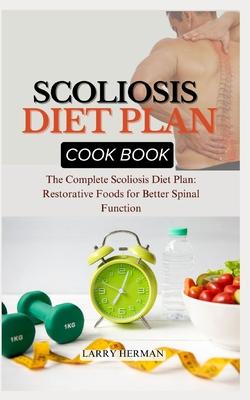
Book
Scoliosis Diet Plan Cook Book: The Complete Scoliosis Diet Plan: Restorative Foods for Better Spinal Function
by Larry Herman
(Write a Review)
Paperback
$9.12
Below are some overarching factors to consider when it comes to diet and scoliosis:
- Consuming a diet that is abundant in vital nutrients, such as vitamins, minerals, and antioxidants, can promote general health. Foods such as fruits, vegetables, whole grains, lean proteins, and dairy products help enhance a comprehensive nutritional profile.
- Sufficient consumption of calcium and vitamin D is essential for preserving bone health. Given that scoliosis affects the spine, it may be advantageous to ensure an adequate intake of these nutrients. Excellent sources of calcium comprise dairy products, such as milk and cheese, as well as leafy green vegetables like spinach and kale. Additionally, fortified foods, which have been enriched with calcium, are also good sources of this essential mineral. Vitamin D is commonly acquired from exposure to sunlight and can also be found in fatty fish, fortified dairy products, and supplements.
- Sustaining Optimal Weight: Having an excessive amount of body weight has the potential to worsen the difficulties linked to scoliosis, since it adds extra pressure on the spine. Hence, it is crucial to uphold a healthy weight by adhering to a well-balanced diet and engaging in consistent physical exercise in order to promote overall well-being.
- Incorporating anti-inflammatory items into the diet may provide relief for persons with scoliosis who experience discomfort or pain. Omega-3 fatty acids, which are abundant in fatty fish, flaxseeds, and walnuts, as well as antioxidants found in fruits and vegetables, are believed to possess anti-inflammatory characteristics.
- Water Intake: Maintaining proper hydration is crucial for optimal health and can contribute to the preservation of muscle and joint flexibility. Optimal hydration promotes the body's inherent processes and potentially enhances overall well-being for those with scoliosis.
It is important to highlight that although these dietary considerations can promote overall health and well-being, they should not be seen as a substitute for medical interventions or other treatments advised by healthcare professionals. Individuals diagnosed with scoliosis should seek guidance from their healthcare team, which may consist of orthopedic doctors, physical therapists, and dietitians, in order to create a complete and tailored strategy for managing their disease.
Below are some overarching factors to consider when it comes to diet and scoliosis:
- Consuming a diet that is abundant in vital nutrients, such as vitamins, minerals, and antioxidants, can promote general health. Foods such as fruits, vegetables, whole grains, lean proteins, and dairy products help enhance a comprehensive nutritional profile.
- Sufficient consumption of calcium and vitamin D is essential for preserving bone health. Given that scoliosis affects the spine, it may be advantageous to ensure an adequate intake of these nutrients. Excellent sources of calcium comprise dairy products, such as milk and cheese, as well as leafy green vegetables like spinach and kale. Additionally, fortified foods, which have been enriched with calcium, are also good sources of this essential mineral. Vitamin D is commonly acquired from exposure to sunlight and can also be found in fatty fish, fortified dairy products, and supplements.
- Sustaining Optimal Weight: Having an excessive amount of body weight has the potential to worsen the difficulties linked to scoliosis, since it adds extra pressure on the spine. Hence, it is crucial to uphold a healthy weight by adhering to a well-balanced diet and engaging in consistent physical exercise in order to promote overall well-being.
- Incorporating anti-inflammatory items into the diet may provide relief for persons with scoliosis who experience discomfort or pain. Omega-3 fatty acids, which are abundant in fatty fish, flaxseeds, and walnuts, as well as antioxidants found in fruits and vegetables, are believed to possess anti-inflammatory characteristics.
- Water Intake: Maintaining proper hydration is crucial for optimal health and can contribute to the preservation of muscle and joint flexibility. Optimal hydration promotes the body's inherent processes and potentially enhances overall well-being for those with scoliosis.
It is important to highlight that although these dietary considerations can promote overall health and well-being, they should not be seen as a substitute for medical interventions or other treatments advised by healthcare professionals. Individuals diagnosed with scoliosis should seek guidance from their healthcare team, which may consist of orthopedic doctors, physical therapists, and dietitians, in order to create a complete and tailored strategy for managing their disease.
Paperback
$9.12